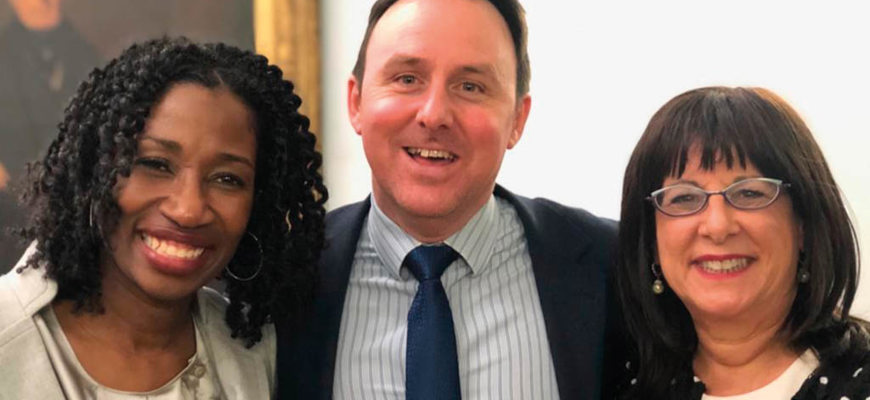Shared humanity

People are not used to judges talking about love, but they just need someone to believe in them.” It’s probably an alien experience to their lawyers also, but the humanity behind it was the focus of a week-long mission to Scotland last month.
The visiting speaker was Judge Ginger Lerner-Wren, who created the first mental health court in the USA, in Florida in 1997. Conceived from her experience of a system that failed to recognise the needs of the individual and produced the “revolving door” syndrome of repeat offending, punishment and release, her “therapeutic justice” approach has since been adopted in hundreds of courts across the States. Her own court alone, she calculates, has diverted some 21,000 people from jail in its 22 years.
Judge Lerner-Wren formed a double act with Judge Victoria Pratt, who turned a notorious municipal court (mainly dealing with non-violent offenders) in Newark, New Jersey, into a “problem-solving court” that won the respect of the local community by treating those who appeared before it with dignity and understanding. Again, it has since been widely copied across the USA, where there are now more than 3,000 such courts of many different kinds, extending also into the civil sphere for child welfare cases.
Scotland is not without such initiatives, and during their week here the judges took a close look at the work of Community Justice Scotland, along with visits to courts and places of custody, and meetings with the Lord Justice Clerk and other judges, Justice Secretary Humza Yousaf and MSPs.
While they also found time for the media, it was at a series of public meetings that they were able to expand on their approach and its impact. What did we learn?
Respect is key
Judge Pratt introduced herself as the daughter of a Harlem-born African-American who spent his summers in the segregated south, and of a Dominican beautician. The judge had been brought up to treat everybody with dignity and respect, no matter how they looked or spoke.
In her experience, courts were often directly hostile and intimidating to people, as well as impacting on their financial and family situation: “They get scolded about violating court rules they know nothing about. Procedural justice is a simple idea to restore humanity.”
She maintained that if people perceive the process to be fair, and are treated with dignity, they will be satisfied with a decision even if it goes against them.
The most important factor was how judges spoke to those appearing. “I realised their need for help was greater than my fear of appearing vulnerable on the bench.”
Pratt’s four-point approach is:
- Give people an opportunity to tell their story. Her case study was an 18-year-old woman charged with possession of a small knife. It emerged she was scared all the time, kept the knife under the pillow and barricaded herself in her bedroom because her mother’s boyfriend was molesting her at night and she didn’t trust anyone enough to confide in them.
- Be careful to avoid the perception that judges are working with the police, social work, etc. This can easily come across in court if those concerned are not careful.
- Understanding by those appearing is essential. Use plain language. Ask questions in a way people will understand, for example about taking medication, and you can take an informed decision.
- The key is respect. Without it, none of the other elements will work. When Pratt was assigned to the “worst court” on the circuit, she decided she would change attitudes by changing her own.
She told of a habitual offender, a drug addict for 30 years. She learned he had a son then aged 32, and said he must never have had the opportunity to be a father to his son – at which he started to cry. She let him go for two weeks; the court officer said he would never come back, but he did, saying: “You showed me more love than I ever had for myself.”
She concluded: “When the court behaves differently, the community responds differently.”
Court turned inside out
Judge Lerner-Wren had held a public guardian position when in practice in Florida, and discovered that support in cases where there were mental health issues was seriously lacking, especially for family members.
She resolved to try to make a difference, and got her chance with the case of a young man who suffered brain injuries in a motorcycle accident. Poor treatment in detention only worsened his condition; one day he was released to his family without warning, and some time later caused the death of an elderly woman after having a panic attack. His lawyer succeeded in obtaining a grand jury investigation, which produced a scathing report on the lack of suitable provision. Ultimately, Lerner-Wren was allowed to set up a “court of refuge” so people could get the care they needed.
“We had no money, no grants, just a shared vision”, she told her audience. “We showed what a small group of dedicated people can do to achieve change.”
She admitted to thinking from her practice experience that she “knew the faces of mental illness”, but she was wrong. Professionals, artists, all sorts of people can be sufferers.
And she quoted the statistic that more than 90% of justice-involved women have experienced some sort of trauma or adverse childhood experience.
She wanted to hear these stories, to “turn the court inside out, with the person’s dignity as the centrepiece” – asking questions like: “What was it like when you were little?” Hence her comment already quoted, on judges talking about love.
Despite its success, she emphasised that the court is not for everyone, but impressive numbers have been diverted away from the justice system. “It’s an alternative way for judges to view the law, if they choose.”
From the floor
Replying to questions at an event in Parliament House, Lerner-Wren explained that yes, the media had been onside, and a vital support: they had “captured the narrative” and were able to humanise the case that started it all. They were part of the court’s stakeholders – “not because we’re so great, but because we took action, and every other jurisdiction was experiencing the same thing”.
What about compliance rates – and cost implications? Lerner-Wren emphasised that the courts were voluntary. “We have had tremendous success because we are engaging with individuals, building trust, but also teaching as we go” – for example, teaching someone with diabetes how to manage their condition.
Pratt reported an overall 70% compliance rate, despite the drug problems of some of those appearing. “We couldn’t save everyone”, though with some they could alleviate many of the issues. The collaborative nature of the courts, working with other agencies, means higher costs at the time, but success brings savings elsewhere.
Another questioner, no doubt having in mind the judges’ accounts of people they had dealt with having come back to see them and start chatting during a court hearing, said they had been taught that respect for the law meant respect for its procedure also. Had that been a difficult shift of mindset?
It wasn’t an issue, Lerner-Wren replied. She didn’t have a “roadmap” at the start but was purposefully intending to change the culture of the court to put dignity at the centre – the dignity that recognised the personhood and the experiences of the people they were going to be serving. For Pratt, respect changes everything: her process is fair but “there is accountability at the courthouse”.
A sheriff commented that every now and then, they try something different with a repeat offender, but the biggest single problem was the old temptations recurring as soon as they were put back into their own environment. Pratt agreed: “We can’t fix those problems – it’s very challenging. That’s why you have to get the legislators on board.”
Reflections
Asked for her thoughts on her visit, Lerner-Wren responded: “I returned home to Florida inspired by the passion of your ‘Presiding with Kindness’ community justice stakeholders. Leaders, driven to promote the health, safety and welfare of the communities through problem-solving justice innovations.
“These therapeutic and interdisciplinary approaches to the law offer individualized behavioral healthcare and social services over punishment, engaging court participants through dignity and hope for quality of life with accountability.”
The visit was masterminded by Livingston solicitor Iain Smith, through his commitment to highlighting the issue of adverse childhood experiences and their effect on behaviour in later life (see Journal, February 2019, 16).
He commented: “During the week-long visit, the judges witnessed different aspects of the Scottish criminal justice system: Polmont Young Offenders Institution, where they discussed rehabilitation with a group of young men; the state hospital at Carstairs, visiting patients and staff; appearing on the BBC News; sitting in on cases calling in the sheriff court; meeting the Justice Minister and Justice Committee at the Parliament; and presenting their judicial methods to an audience of 600 people.
“Judges Pratt and Lerner-Wren spoke wisely about what they do in America and did not suggest how our judges in Scotland should preside. That said, one sheriff had asked me for data to show how treating people with dignity and respect was successful. Surely you only need basic humanity rather than statistics.
“If we truly seek to disrupt the cycle of offending behaviour, all court participants must take part in shaping change. Judges ‘Presiding with Kindness’ when dealing with vulnerable, damaged and traumatised offenders could be the catalyst for change. It will take judges to be bold to try something counter-intuitive and new.
“Our system is not broken, but many of the people coming before the court are. Once we recognise the impact of trauma on people’s lives, we can start to repair, rehabilitate and reform rather than seek retribution.”
In this issue
- Time to promote shared care?
- Client medical records: a matter of right
- Search for the route to healing
- Rights after “same roof”
- Are you a qualified creditor?
- Reading for pleasure
- Opinion: Allan Jamieson
- Book reviews
- Profile: John Laughland
- President's column
- ScotLIS update
- People on the move
- Common law and artificial life
- FAIs: addressing the concerns
- Challenging times
- Shared humanity
- Cases of the paperless will
- How to manage your legal practice for success
- Fairness v Convenience
- Moorov then and now
- Personal licences: the uncertainty continues
- Is Airbnb use a planning matter?
- Insolvency Rules: a positive realignment
- IR35 compliance moves up the ladder
- “Best interests” in the balance
- Scottish Solicitors' Discipline Tribunal
- PSG tackles index-linked rent reviews
- Finding the right seat
- Public policy highlights
- Accredited paralegal update
- Events, and more, for members
- Accredited Paralegal Committee profile
- Second thoughts on executor declarations
- Client communication – a continuous journey
- Reflections from the Commission
- Love my tender
- Ask Ash






